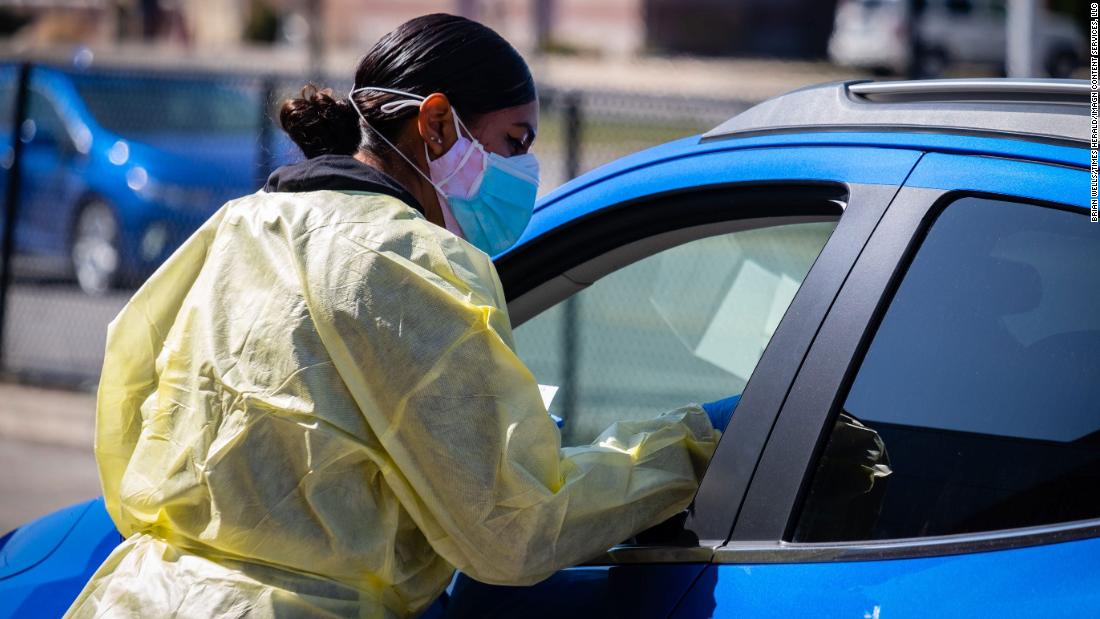“America appears to have ended the pandemic,” said Dr. Michael Osterholm, director of the Center for Infectious Disease Research and Policy at the University of Minnesota. “The virus did not wipe us out.”
More than 15,000 cases of the coronavirus B.1.1.7 variant, which also appears to be the most deadly, have been reported in the USA. While the United States is rushing to vaccinate Americans in time, many experts are asking the public to stick to precautions for a little while longer.
“We will not have enough vaccines, the way we are going, in the arms of enough Americans over the next six to ten weeks with this increase that we are going to stop it,” Osterholm told CNN’s Erin Burnett. “It just won’t happen.”
And while the U.S. is vaccinating almost five times faster than the global average, with 40% of adults having received at least one injection, low-income countries with limited access to the vaccine can become a place for variants to get out of control , said Osterholm.
Fortunately, the United States has conditions that can help combat another outbreak: increased vaccination rates, a significant percentage of the population has already been infected and the climate warms up, said Dr. Paul Offit, a member of the FDA’s Vaccine Advisory Committee.
Restrictions make it easier with the increase in vaccinations
The White House said on Monday that there will be enough vaccines for all Americans by the end of next month, and some states have started making plans for a return to normal.
In Washington, DC, Mayor Muriel Bowser is calling on residents to be vaccinated as soon as they can. It is also loosening a lot of restrictions as of May 1, including allowing live entertainment sitting indoors with 25% capacity, and recreational centers, libraries, museums and galleries and non-essential retail will be able to operate at 50% capacity indoors or outdoors.
“We know that we can expect some case increases this month, but with ongoing vaccinations and safeguards, we hope that later in the spring these cases will decrease,” said the mayor, before reminding residents to “get vaccinated as soon as possible as you have the oportunity. ”
Bowser is one of many local and state leaders to ease restrictions, although maintaining precautions is still a crucial part of the fight against the virus, said Dr. Ashish Jha, dean of Brown University School of Public Health, Wolf Blitzer of CNN.
“We are not there yet and the variants make it particularly worrying,” said Jha. “We really have to squat for a few more weeks. We are very close to the finish line, but we still cannot stop.”
Covid-19 cases have been on the rise for four consecutive weeks, in part because of the spread of the variants, said Dr. Rochelle Walensky, director of the Centers for Disease Control and Prevention in the United States.
And across the state, there are at least 81 new groupings in K-12 schools, according to data released by the Michigan Department of Health and Human Services on Monday.
In Ohio, an increase in the positivity rate sent the state to an order “back to basics and common sense” about preventing Covid-19, said Governor Mike DeWine.
The new “simplified” order, which should be ready for signature by the end of this Monday, includes the use of masks in most closed places, avoiding gathering in groups larger than 10 people and maintaining social distance.
“It’s really a race,” said DeWine. “These are the things we need to do as we go.”
Health experts discuss delays in the second dose
With the threat of another possible increase, health experts are debating whether to stick with the current vaccination schedule or postpone second doses to ensure that more Americans get their first dose quickly.
“Now, with the increase that is about to occur, this is what we want to do now is to protect as many people as possible so that they do not contract serious illnesses, hospitalizations and death,” said Osterholm.
The decision to focus on the first few doses may depend on the supply, Dr. Kent Sepkowitz, an infectious disease specialist at Memorial Sloan Kettering, told CNN on Monday.
“If the stock is running low, then yes, I think we should optimize ‘very good’ vaccination for more people than ‘super-duper’ protection for less,” said Sepkowitz.
Although a single dose provides protection against the virus, it is not yet clear how long this protection lasts, said Dr. Anthony Fauci, director of the National Institute of Allergy and Infectious Diseases, Elizabeth Cohen of CNN on Monday.
And considering that the spreading variants can decrease the effectiveness of vaccines, “you are in a tenuous zone if you don’t have the full impact,” said Fauci.
“So there is some merit to the arguments put forward,” said Fauci. “But now, given the number of vaccines that we can give every day, literally with each passing day, we are getting closer and closer to where we want to be.”
CNN’s Michael Nedelman, Deidre McPhillips, Nikki Carvajal, Kay Jones, Rebekah Riess, Jen Christensen, Dave Alsup, Joe Sutton, Virginia Langmaid and Alec Snyder contributed to this report.
